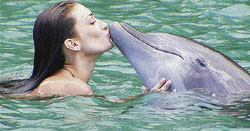
|
|
|
|
|
|
|
|
|
|
|
|
|
|
|
|
|
|
|
|
|
|
|
|
| Point of Interest |
UN brings pressure on dolphinariums Claudia Gardner, Hospitality Jamaica Writer Dolphinaria in Jamaica and the Caribbean are likely to come under increased pressure in the new year, following the United Nations declaration of 2007 as 'The Year of the Dolphin'.
As the dawn of the new year looms, international animal rights and environmental advocates are rearing to kick-start the campaign to protect dolphin species worldwide. German-based tourist group TUI which owns 50 percent shares in RIU hotels, and the Whale and Dolphin Conservation Society (WDCS) have partnered with the UN, through its Convention on Migratory Species, to save the aquatic mammals, many of which are reportedly being hunted globally with impunity. serious concerns In a release issued on September 15 this year, the UN voiced serious concerns that the global dolphin stock might be facing extinction and that it had made the declaration in a bid "to stop this process." "Threats for dolphins are on the rise," the UN release said. "They face entanglement in fishing nets, marine pollution, prey depletion due to over-fishing, deliberate hunting and disturbance from noise. These are only some of the causes why they might soon be extinct in the world's seas. This campaign will involve govern-ments, NGOs and the private sector around the world to emphasise the need to protect dolphin species." In another article published by the UN communications department, UN Works, earlier this year, the UN stated that while many people on holiday love to see dolphins perform at marine parks, the proliferation of "dolphinariums aimed at the tourist industry, is a big concern." "Many are unsafe for dolphins, which die after a very short period only to be replaced by more dolphins," the UN report said. The United Nations Environment Programme (UNEP) is trying to promote awareness of the problem so conditions can improve for dolphins in captivity. UNEP guidelines advocate dolphin conservation and prohibit their captivity, unless education and management programmes are also included. In Jamaica local environmental group the Jamaica Environment Trust, (JET) has embraced the UN declaration. "JET is upbeat about the United Nation's decision," Christine O'Sullivan, Marine Mammal Specialist at the organisation told Hospitality Jamaica. "We are hoping it will create more awareness and there will be more campaigns. Everybody loves dolphins. People get very emotional when they think about them. We believe people will understand why dolphins should not be held captive, once they become more aware." The Humane Society of the United States (HSUS) in an article titled "Held captive: Developing Nations", published earlier this year, stated that attendance at marine parks had declined in the United States, Canada and the nations of Europe which it attributed to "growing understanding of the intelligence of dolphins cetaceans in these countries". The HSUS stated that developing nations are headed in the opposite direction. "Business is booming at marine parks in areas such as the Caribbean, the South Pacific, and Mexico and that in Jamaica, the outlook is less rosy," the report said. |
All
rights reserved by the Gleaner Company Ltd.
© Gleaner
Company | Produced by Go
Jamaica
Hospitality Jamaica is updated every two (2) weeks
